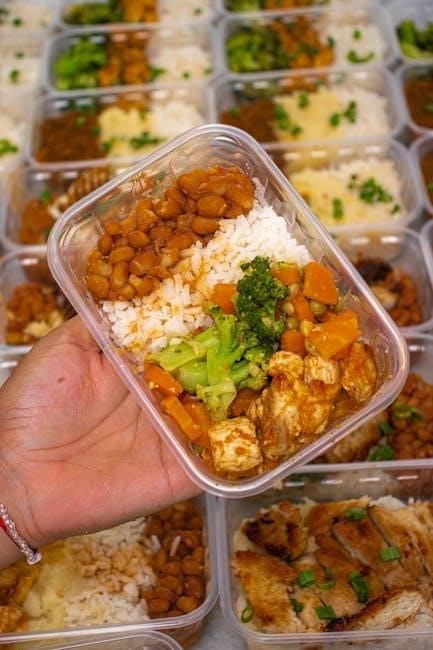
printable bariatric meal plan pdf
Printable Bariatric Meal Plan PDF: A Comprehensive Guide
Embark on a transformative journey with our comprehensive guide to printable bariatric meal plans in PDF format. We provide essential tools and resources, aiding successful weight management and overall health after bariatric surgery. Discover customizable plans and expert advice here.
Understanding Bariatric Meal Plans
Bariatric meal plans are meticulously crafted dietary regimens designed specifically for individuals undergoing or who have undergone weight loss surgery. These plans prioritize nutrient density while managing caloric intake, crucial for post-surgical healing and long-term weight management. They differ significantly from standard diets, focusing on high protein and low carbohydrates to support muscle mass and promote satiety.
The primary goal of these plans is to facilitate steady weight loss while preventing nutritional deficiencies that can arise due to altered digestive processes following surgery. Understanding the nuances of a bariatric meal plan involves recognizing the phased approach, starting with liquid diets and gradually progressing to solid foods, each stage tailored to the body’s healing and adaptation.
Moreover, these plans emphasize mindful eating habits, portion control, and regular hydration to optimize digestion and prevent complications. Adherence to a structured bariatric meal plan is paramount for achieving sustained weight loss and improving overall well-being after bariatric surgery, ensuring patients receive the necessary nutrients for a healthy and fulfilling life.
Pre-Bariatric Surgery Meal Plans
Before undergoing bariatric surgery, adhering to a specific meal plan is critical for optimizing surgical outcomes. This pre-operative diet aims to reduce liver size, making the surgery safer and more effective. Typically, these plans are low in carbohydrates and calories, often incorporating high-protein shakes and lean protein sources to promote weight loss and preserve muscle mass.
The pre-bariatric surgery meal plan also focuses on eliminating processed foods, sugary drinks, and high-fat items, preparing the body for the significant dietary changes post-surgery. This phase helps patients adapt to smaller portion sizes and develop healthier eating habits, setting the stage for long-term success. A structured pre-operative diet can also improve metabolic health.
Following the surgeon’s specific dietary guidelines is essential, as deviations can lead to surgical complications. The duration of the pre-operative diet varies, but it typically lasts one to two weeks. This period is crucial for both physical preparation and mental readiness, empowering patients to embrace the lifestyle changes necessary for a successful bariatric journey.
Post-Bariatric Surgery Meal Plans: Initial Stages
The initial post-bariatric surgery meal plan is crucial for healing and adaptation; Immediately following surgery, the diet progresses through stages, starting with clear liquids to prevent strain on the new stomach pouch. This phase, lasting about a week, includes broth, sugar-free gelatin, and diluted juice, ensuring hydration and minimal digestive effort.
The next stage introduces pureed foods, like strained soups, unsweetened applesauce, and protein shakes, providing essential nutrients in an easily digestible form. This phase typically lasts one to two weeks, allowing the digestive system to adjust gradually. Portion sizes are small, often just a few tablespoons, to avoid discomfort and prevent complications.
As tolerance improves, the diet advances to soft foods, such as cooked vegetables, ground meat, and cottage cheese. This stage focuses on increasing protein intake, vital for healing and maintaining muscle mass. Throughout these initial stages, meticulous adherence to the surgeon’s guidelines is paramount, ensuring proper healing, preventing dehydration, and establishing a foundation for long-term dietary success. Regular monitoring and support from a registered dietitian are invaluable.
Long-Term Bariatric Meal Planning: Maintenance Phase
The maintenance phase of bariatric meal planning is a lifelong commitment to healthy eating habits. This stage focuses on sustaining weight loss and preventing nutritional deficiencies. A balanced diet rich in protein, fruits, vegetables, and whole grains is essential. Protein intake remains a priority, supporting muscle mass and satiety.
Meal planning involves structured, portion-controlled meals and snacks, typically consumed every 3-4 hours, preventing overeating and maintaining stable energy levels. Hydration is crucial, requiring consistent fluid intake throughout the day. Vitamin and mineral supplementation, as prescribed by a healthcare provider, addresses potential deficiencies.

Regular physical activity complements the dietary plan, promoting overall health and well-being. Avoiding sugary drinks, processed foods, and excessive fats is vital for long-term success. Mindful eating practices, such as savoring each bite and paying attention to hunger cues, support healthy food choices. Ongoing support from a registered dietitian or support group helps navigate challenges and maintain motivation. This phase is about building a sustainable lifestyle, fostering a positive relationship with food, and enjoying the benefits of improved health.
Key Components of a Bariatric Meal Plan
A successful bariatric meal plan hinges on several essential components, primarily focusing on nutrient density and controlled portions. Protein takes center stage, crucial for preserving muscle mass and promoting satiety. Lean meats, poultry, fish, eggs, and dairy products should form the basis of each meal. Vegetables are another cornerstone, contributing essential vitamins, minerals, and fiber. Non-starchy vegetables like leafy greens, broccoli, and cauliflower are preferred.
Fruits, while nutritious, need careful moderation due to their sugar content. Whole fruits are generally better than juices. Whole grains provide sustained energy and fiber, but portion sizes must be carefully managed. Healthy fats, such as those found in avocados, nuts, and olive oil, are important but should be consumed in small amounts.
Hydration is paramount, with water being the beverage of choice. Sugary drinks should be strictly avoided. Portion control is essential to prevent stretching the stomach pouch. Regular, structured meals and snacks help manage hunger and prevent overeating. Supplementation, as directed by a healthcare professional, addresses potential nutrient deficiencies. Finally, mindful eating practices, focusing on savoring each bite and recognizing fullness cues, support long-term adherence to the plan.
Sample 7-Day Bariatric Meal Plan
This sample 7-day bariatric meal plan provides a framework for post-operative eating, emphasizing protein, vegetables, and portion control. Consult your healthcare provider for personalized adjustments.
Day 1: Breakfast: Protein shake (20g protein). Lunch: 1/2 cup cottage cheese with 1/4 cup pureed fruit. Dinner: 2oz baked chicken with 1/4 cup steamed green beans. Snack: Sugar-free gelatin.
Day 2: Breakfast: Scrambled egg (1 egg). Lunch: Pureed lentil soup (1/2 cup). Dinner: 2oz flaked fish with 1/4 cup mashed sweet potato. Snack: Protein pudding.

Day 3: Breakfast: Greek yogurt (1/2 cup, plain, non-fat) with protein powder. Lunch: 2oz ground turkey with 1/4 cup pureed vegetables. Dinner: Soft-cooked tofu with 1/4 cup spinach

Day 4: Breakfast: Protein smoothie (whey isolate). Lunch: Egg salad (1 egg, light mayo) without bread. Dinner: 2 oz shrimp with 1/4 cup zucchini. Snack: Sugar-free popsicle.
Day 5: Breakfast: Cottage cheese (1/2 cup). Lunch: Blended black bean soup (1/2 cup). Dinner: 2oz lean ground beef with 1/4 cup cauliflower mash. Snack: Unsweetened applesauce.
Day 6: Breakfast: Protein oatmeal (1/4 cup oatmeal). Lunch: 2oz tuna (canned in water) with light mayo. Dinner: 2oz chicken breast with 1/4 cup carrots. Snack: Jello.
Day 7: Repeat your favorite from the week. Remember to drink water throughout the day.
Utilizing Bariatric Meal Plan Templates (PDF)
Bariatric meal plan templates in PDF format are invaluable tools for structuring your post-surgery diet. These templates provide a framework for organizing meals, tracking nutrient intake, and ensuring adherence to dietary guidelines. They often include sections for breakfast, lunch, dinner, and snacks, allowing you to plan your meals in advance and maintain consistency.
Using a template helps you visualize your daily intake, making it easier to monitor protein, carbohydrates, and fats. Many templates are customizable, enabling you to tailor them to your specific needs and preferences. You can input your favorite recipes, portion sizes, and dietary restrictions, creating a personalized meal plan.
Furthermore, these templates often incorporate space for tracking hydration and supplements, essential components of bariatric care. Regularly reviewing and updating your meal plan template can promote long-term success by reinforcing healthy eating habits and preventing dietary complacency. Available online, these templates can easily be downloaded, printed, and used for weekly meal planning.
Utilizing bariatric meal plan templates empowers patients to actively participate in their nutritional management, fostering a sense of control and promoting sustainable weight loss.
Importance of Protein Intake
Protein intake is paramount following bariatric surgery, playing a pivotal role in recovery, muscle preservation, and overall health. After surgery, the body requires adequate protein to heal tissues, support metabolic functions, and prevent muscle loss, which can occur due to reduced food intake. Prioritizing protein helps maintain lean body mass, which is crucial for burning calories and sustaining weight loss.
Consuming sufficient protein also aids in satiety, helping you feel fuller for longer and reducing the likelihood of overeating or snacking on unhealthy foods. This is particularly important in managing portion sizes and adhering to the recommended dietary guidelines. High-protein diets have been shown to stabilize blood sugar levels, preventing energy crashes and cravings.
Good sources of protein include lean meats, poultry, fish, eggs, dairy products, and plant-based options like beans and lentils. Incorporating protein into every meal and snack ensures a steady supply of amino acids, the building blocks of protein, which are essential for various bodily functions. Monitoring protein intake and adjusting it as needed can optimize outcomes.
Ultimately, adequate protein intake is fundamental to achieving and maintaining long-term weight loss and overall well-being after bariatric surgery. It’s crucial to consult with a registered dietitian to determine individual protein needs and create a personalized meal plan.

Where to Find Printable Bariatric Meal Plans
Locating reliable and effective printable bariatric meal plans involves exploring various resources. Start by consulting your bariatric surgeon or registered dietitian, as they often provide customized meal plans tailored to your specific needs and surgical procedure. These plans are designed to meet your nutritional requirements and support your post-operative recovery.
Hospital and clinic websites dedicated to bariatric surgery are excellent sources. Many offer downloadable PDF meal plan templates, guidelines, and recipes. These resources are typically developed by healthcare professionals and are evidence-based. Additionally, reputable bariatric surgery support groups and online forums often share meal plans and tips from experienced patients.
Websites specializing in nutritional information and healthy eating can also be valuable. Look for sites that offer bariatric-specific content or allow you to filter meal plans based on dietary restrictions and calorie counts. Be sure to verify the credentials of the source and consult with a healthcare provider before making any significant changes to your diet.
Finally, consider using bariatric food coach websites. Remember, the best meal plan is one that aligns with your individual needs and preferences, so explore different options and adapt them as needed.
Related Posts

jack pyke jacket size guide
Don’t guess your size! Our Jack Pyke jacket size guide (UK measurements!) ensures a perfect fit. Shop confidently & look sharp. Get yours today!
orea rental application form 410 pdf download
Download UK rental application form 410 in PDF format for free from our site

game of bricks home alone instructions
Uh oh! Bricks everywhere and no Home Alone LEGO instructions? Don’t panic! Find your brick-saving guide here and rebuild that iconic house!